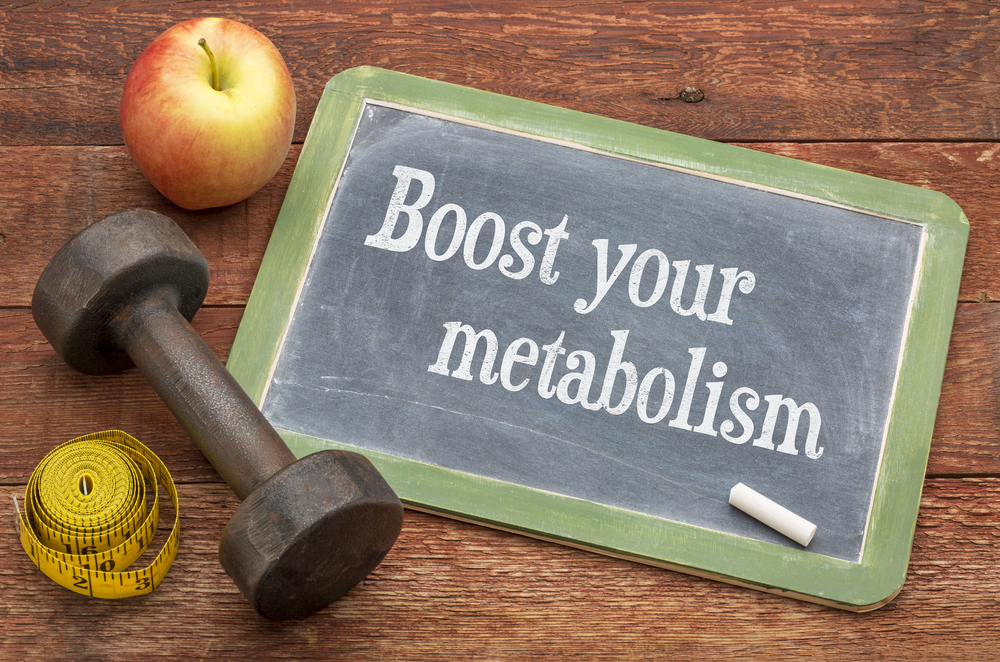Are you feeling sluggish? Are you having difficulty losing weight? Maybe you should SPEED your metabolism. A slow metabolism can be caused by our environment and our habits. It will likely take more than a few days to increase your metabolism and get back on track.
What are some ways to improve the process of metabolism and how can you do it naturally? A few adjustments to your habits and routine can help increase your metabolism, leading to weight loss, increased lean muscle mass, more energy and a better overall quality of life.
The first step to improving your metabolism is understanding what causes a slow metabolism.
Slow Metabolism Causes
1. Sleep
According to the National Sleep Foundation, we as a society are not getting enough sleep, averaging only 6.8 hours per night instead of the recommended 7-9 hours for adults.
Sleep is important for maintaining hormonal and metabolic balance in the body. Poor sleep hygiene can lead to problems with metabolism and heart health, caused by things like too much stimulation of the nervous system, hormone changes, and inflammation.
The National Sleep Foundation released new sleep times in 2022 to help individuals get the right amount of sleep. The following recommendations may be useful to you. Not getting enough sleep can really screw up your metabolism.
- Age: 0-3 months Recommended Sleep: 14 to 17 hours
- Age: 4-11 months Recommended Sleep: 12 to 15 hours
- Age: 1-2 years old Recommended Sleep: 11 to 14 hours
- Age: 3-5 years old Recommended Sleep: 10 to 13 hours
- Age: 6-13 years old Recommended Sleep: 9 to 11 hours
- Age: 14-17 years old Recommended Sleep: 8 to 10 hours
- Age: 18-64 years old Recommended Sleep: 7 to 9 hours
- Age: 65 and over Recommended Sleep: 7 to 8 hours
If you don’t get enough sleep, it can affect your body’s ability to process sugar and the hormones that control your metabolism. Sleep deprivation over a long period of time can lead to obesity and diabetes.
Oftentimes, we don’t get restful sleep because we don’t allow our bodies to recover during sleep. Why not? Our diet does not contain enough of the important nutrients that help us sleep and recover better, such as zinc, magnesium, and vitamin B6.
Sleep Hygiene Tips:
- Start a bedtime routine.
- Have a wind-down period and regular bedtime.
- It is advised that you should turn off your electronics and keep them away from where you sleep, in order to avoid any potential health risks.
- Maintain a cool, dark, and quiet sleep environment.
- It is advised to avoid caffeine later in the day and instead drink alcohol in the evening.
- Avoid processed foods and sugar.
- Get some outside time during the day.
- You might want to consider getting a sleep study done to see if you have apnea if you’ve been experiencing chronic insomnia.
- You should speak to your healthcare provider before taking any supplements, such as melatonin, valerian root, lemon balm, or CBD.
2. Psychological Stress
The body reacts to acute stress by releasing the hormone corticotropin-releasing hormone, which activates the “fight or flight” response. This, in turn, stimulates the sympathetic nervous system.
Acute stress can lead to a loss of appetite and weight. If someone is constantly stressed, they may turn to overeating unhealthy foods as a coping mechanism. This can lead to weight gain and an increase in fat around the stomach area.
The long-term effects of stress on the body can be damaging, caused by the release of hormones like glucocorticoids and neuropeptide Y. These hormones can disrupt metabolism and lead to obesity.
3. Minimize Processed Foods
Why do you keep eating foods that are bad for you if it is no secret that they are harmful? The negative habits you have developed have instructed your body and mind to long for them and as a result, you have created a problem.
Sugars, fiber, and chemicals can ruin your metabolism by making you resistant to insulin.
If your body is unable to process insulin properly, you may experience a slow metabolism, weight gain, and an increased risk of diseases associated with high levels of stored fat. Processed foods are similar to a sweet seductress in that they exploit your weak willpower and cause harm to your body from the inside.
Not worth it if you ask me. To eat healthier, you should limit the amount of sugar you consume and avoid processed foods.
READ MORE: How Much Sugar Is Safe To Eat?
4. Don’t Cut Carbs Immediately
Whaaaat!? Yeah! While carbohydrates may not be the “bad guy” when consumed in moderation, consuming them in excessive amounts can have negative consequences. While simple carbs and complex carbs are different (you can read more about that here), carbs actually increase the pressure inside cells that comes from water (aka cellular hydration).
Consuming quality complex carbohydrates in appropriate amounts through a nutritious diet makes you feel fuller and feel fuller for longer. By doing this, you also increase your metabolic rate.
Carbohydrates are needed by your body’s tissues for energy. Complex carbohydrates include potatoes, bread, rice, pasta, fruits, vegetables, legumes and whole-grain cereals. Fiber is a carbohydrate found only in plants.
Purium’s Power Shake contains 21 grams of carbohydrates per serving. Power Shake can help support healthy cholesterol, blood glucose levels, digestion and weight loss.
5. Get Outside More
Woohoo! Who doesn’t want to get outside more? Even if it’s just for a walk around the block with your kids or playing Frisbee with your dog, your body will thank you for getting out more often.
We recommend that you head outside first thing in the morning! Although it may seem difficult at first, and you will need to set aside an extra half an hour each morning, it will be worth it for your health and metabolism.
When you get back from your run, eat a nutritious breakfast and then continue on with the rest of your day.
6. Be More Social
Having strong social ties with family and friends can do more than just improve your mood – it can also help to speed up your metabolism.
Not having a strong social network has been linked with worse health outcomes. If you are socially integrated, meaning you have a strong social network and are tied to your community, you are less likely to have metabolic problems.
The benefits of maintaining social connections and good mental health are numerous and well-documented. There are many benefits to having close relationships, including reducing anxiety and depression, increasing self-esteem, becoming more empathetic, and developing more trusting and cooperative relationships.
Spending time with friends and family can help you lose weight, gain muscle, and boost your metabolism.
7. Hydrate Often
Drinking enough water has been reported to help with weight loss and increase insulin sensitivity.
The more fluids you have in your body, the easier it is for your cells to move around and for your body to deliver oxygen, blood, and nutrients.
If you have better delivery, your systems will be healthier and happier. Not to mention, you actually feel better!
8. Hit RESTART – Do A 30 Day Reset
Are you ready to clean “house” from the inside out, release unwanted weight and toxins, boost your immunity and hit the reset button on your energy, mood and metabolism?
Have you wondered how you can make positive shifts in your life? Are you searching for ways to look and feel your best?
Whether you want to nourish and detoxify, improve energy and sleep, gain muscle, lose weight, look younger or think clearly and feel happier, the Ultimate Lifestyle Transformation kit provides amazing results to help you feel your best!
Purium’s Ultimate Lifestyle Transformation kit will power you up with 30 days (60 meals) of delicious, pure, organic, and non-GMO, shelf stable superfood nutrition delivered direct to your door. I myself, have lost 10 pounds in 30 days on this program.
9. Environmental Factors
The widespread contamination of the environment is being caused by the synthetic chemicals that are everywhere in our society. This is not an exclusive list, but some of the most common chemicals found in products that can be harmful to your health are pesticides, plasticizers, parabens, VOCs, antimicrobials, and flame retardants.
These EDCs can interfere with hormones, leading to problems with development and reproduction, as well as obesity, metabolic syndrome, and type 2 diabetes. To limit exposure to EDCs, choose organic foods and self-care products that are free of chemicals. This will reduce the burden on your endocrine system, lower the risk of obesity, and improve metabolism.
The Environmental Working Group is a useful resource that can help you limit the amount of chemicals you’re exposed to.
10. Exercise & Physical Activity
Resistance training can help to increase your metabolic rate and the amount of energy you burn each day. The principal mechanism is by augmenting fat-free mass (FFM).
If you want to gain more muscle mass, up your protein intake while doing resistance training. Add lean muscle mass to your body to increase insulin sensitivity, which lowers your risk for diabetes.
You can increase your metabolism by doing high-intensity interval training and by taking advantage of the increased oxygen consumption that comes with it. EPOC is the amount of oxygen your body needs to return to its normal, resting state.
- The production of ATP is used to replace the ATP that is used during a workout.
- Resynthesis of muscle glycogen from lactate.
- The restoration of oxygen levels in venous blood, skeletal muscle blood, and myoglobin is important for the proper function of these tissues.
- Repair of muscle tissue damaged during the workout.
- Restoration of body temperature to resting levels.
Exercise programming to increase metabolism:
1. Resistance training – You should be performing strength exercises three to six times per week, with two to four exercises targeting each body part.
2. HIIT 2x/week – Example: stationary bike. You should pedal quickly for 30 seconds, and then slowly for 1-2 minutes. Repeat for 15 to 30 minutes.
Increase Physical Activity
The average individual should aim to get 10,000 steps a day, as well as 30 minutes to 1 hour of moderate to high-intensity exercise. And we mean, every day.
You need to challenge yourself physically to speed up your metabolism. This can be done by walking further with the dog, playing an extra round of golf, joining a CF Box, taking up group classes, hitting a hot yoga sweat session, or taking the stairs and parking further away.
It’s not only about how you look on the outside, but also about your overall health on the inside. The goal is to increase metabolism, and a big part of that is making your body more accustomed to moving around.
11. Increase Protein Consumption
Protein-rich foods require more energy for your body to digest, which could help you boost your metabolism for a few hours after eating.
Because of the thermic effect of food, the amount of energy your body needs to digest, absorb, and process nutrients. Compared to carbs and fats, protein can increase your metabolic rate by 15–30%.
Protein-rich diets are beneficial not only for their ability to support lean body mass, but also for their potential to reduce the drop in metabolism often seen during weight loss. Eating protein may help you feel fuller for a longer period of time, which can prevent overeating.
Understanding Metabolic Rate
The rate at which your body burns calories is called your metabolic rate. The more calories you need to perform basic functions like breathing, circulation, and cell production, the higher your metabolic rate. Age, gender, height, weight, body composition, hormones, stress, sleep, the environment, genetics, and health all influence how much water someone needs to drink.
FIND OUT YOUR METABOLIC RATE HERE: Health Surgeon’s Basal Metabolic Rate (BMR) Calculator
You can measure your metabolic rate by determining how much oxygen your body consumes over a specific amount of time. A metabolic cart is used to measure O2 consumption and CO2 production in an indirect calorimetry test.
An individual’s heat production can be measured in calories by direct calorimetry, which involves placing the person in an insulated chamber where the heat is transferred to the surrounding water.
We are fortunate that we don’t have to use direct or indirect calorimetry to measure our metabolism. There are formulas, such as Cunningham and Harris-Benedict, that we can use instead.
Conclusion
If you are feeling that your metabolism is slowing down and you have tried everything, do not give up. Some of the ways to speed up your metabolism, improve your health, and make you happier and better looking are: get adequate sleep, reduce stress, find a social group, improve nutrition, increase exercise and physical activity!
Although appearances are not everything, being either overweight or underweight is often indicative of a dysfunctional metabolism. Creating balance in your life requires determination and discipline, but it can be done if you are truly dedicated to making it happen.
Try Health Surgeon’s Ideal Weight Calculator. This calculator will give you a healthy weight range based on your body and gender.
If you want to speed up your metabolism, you need to set some goals and make a plan. Your body will thank you.









